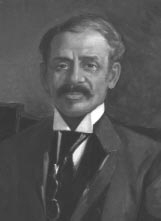
William Peyton Hubbard, (1842 - 1935), was first person of African descent, on Toronto’s City Council. He was first elected in 1894 and served on it for 15 years. Hubbard was born in Toronto to former American slaves, who had escaped via the Underground Railroad. A baker by trade, he was well-known for his strong political opinions, his sharp wit, his convincing oratory and for his strong sense of public duty. His eloquence was such that his fellow politicians dubbed him “Old Cicero.”

George Brown supported him after he had rescued Brown from drowning in the Don River. The horses pulling Brown’s carriage bolted and he was tossed into the river. Brown recognize Hubbard’s political astuteness and encouraged his political ambitions. Not only was he Toronto’s first African Canadian Councillor, he was also Toronto’s first Canadian deputy mayor of African lineage.
He made a name for himself as a champion of little man, protecting the rights of Chinese laundry owners in the city. He also was a supporter of Adam Beck, founder of Toronto Hydro, in his efforts to keep power public.
Losing an election in 1915, Hubbard retired to the Riverdale area of the city, building a home 660 Broadview Ave., now part of Montcrest School, .that he would spend his remaining days in until he died at the age of 93. There is a plaque commemorating this house in the northeast corner of Riverdale Park, just south of Montcrest.
He maintained he had never experienced racism in political office because he ran on his knowledge of real estate, rather than as a “Negro politician,” and said, “I have always felt that I am a representative of a race hitherto despised, but if given a fair opportunity would be able to command esteem.”
Information from several websites and from “I’ve Got A home in Glory Land.”
